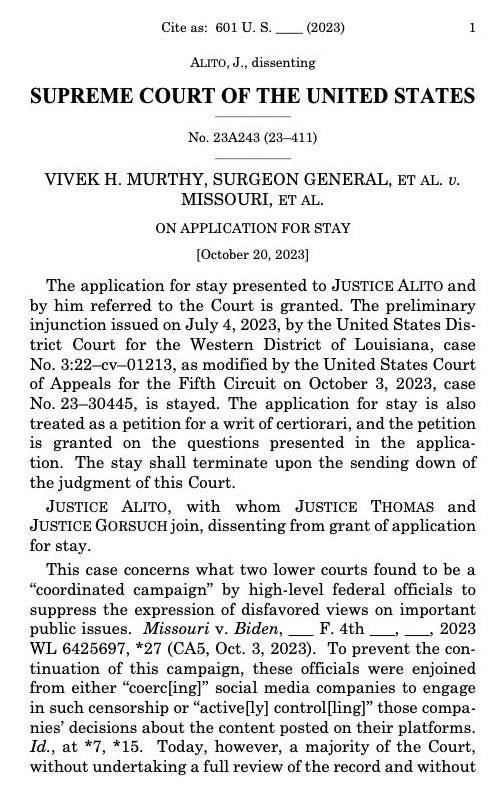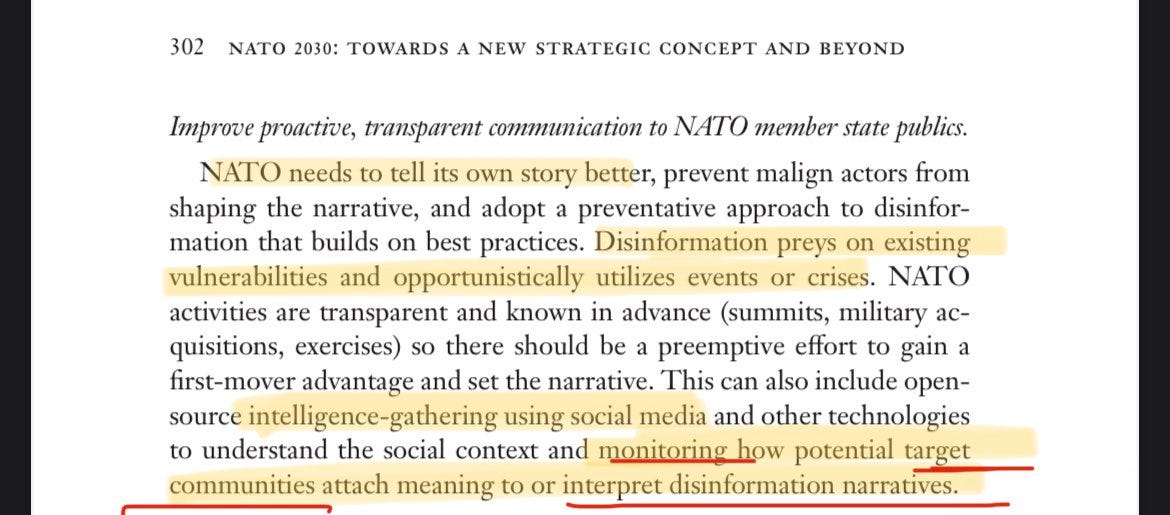The Massive Expansion of State Censorship
We normally avoid political subjects, which usually don’t fit in our niche at the intersection of crime, culture, and media. Having said that, even as an outlet focusing exclusively on crime, the government and academia driven Industrial Censorship Complex has impacted Crime Culture Media directly.
This includes numerous videos that have been removed from the Viktoria Evans YouTube channel, along with multiple account deletions, suspensions, and shadow bans across Facebook, Instagram, Tik Tok, and what was formerly Twitter, since rebranded as X.
In October of 2023, hundreds of academics, scholars, intellectuals, and journalists from across the political spectrum announced the Westminster Declaration - demanding governments dismantle their “Censorship Industrial Complex,” in the name of free speech.
The Westminster Declaration states that, “In a democracy, no one has a monopoly over what is considered to be true.”
The group is “deeply concerned about attempts to label protected speech as ‘misinformation,’ ‘disinformation,’ and other ill-defined terms” because “abuse of these terms has resulted in the censorship of ordinary people, journalists, and dissidents in countries all over the world.”
Their declaration follows years of attempts, some highly successful, to censor social media posts under the aegis of protecting society from dis/mis/malinformation.
One such attempt to censor social media users involves the European Union’s Digital Services Act, which creates a legal framework allowing European governments to impose restrictions on the speech of social media users.
According to the European Union’s website, the Digital Services Act “imposes new mechanisms allowing users to flag illegal content online, and for platforms to cooperate with specialised ‘trusted flaggers' to identify and remove illegal content.”
French President Emmanuel Macron also advocated for the power to censor the internet after weeks of rioting in France that was allegedly coordinated on social media.
"We have to think about the social networks, about the bans we'll have to put in place," Macron said. "When things get out of control, we might need to be able to regulate or cut them off."
Macron’s comments drew criticism comparing the proposed European Union censorship regime to state censorship by China, Iran, and even terrorist organizations masquerading as governments like Hamas.
The Online Harms Act was introduced in Canada by Justice Minister Arif Virani, and would allow a provincial judge to impose house arrest and a fine if there were reasonable grounds to believe a defendant “will commit” an offense. The bill would increase the maximum penalty for crimes like “the willful promotion of hatred” from 2 years to 5 years, and “advocating genocide” from 5 years to life.
Back in the United States, the Westminster Declaration followed the conviction of an American man named Douglass Mackey in April 2023, who was subsequently sentenced to 7 months in a Federal prison in October 2023 for the crime of election interference.
Mackey was charged with election interference after he published satirical memes about voting by text message that he created to disparage Hillary Clinton and her supporters. The satirical meme for which he was jailed, pictured below, included fine print at the bottom that reads, “Must be 18 or older to vote. One vote per person. Must be a legal citizen of the United States. Voting by text not available in Guam, Puerto Rico, Alaska or Hawaii. Paid for by Hillary For President 2016.”
The government claimed at trial that, “On or about and before Election Day 2016, at least 4,900 unique telephone numbers texted 'Hillary' or some derivative to the 59925 text number, which had been used in multiple deceptive campaign images tweeted by Mackey and his co-conspirators."
As far as we can determine from the justice department’s own public statements on the case, and what was published in the news, none of these alleged voters seem to have been called as government witnesses to testify in order to prove that they were tricked by these memes or even to explain how they were tricked.
The United States does not now and has never allowed voting by text message, an easily verifiable fact. Those who made similar memes targeting conservative voters have not been prosecuted for election interference or any other crime.
Over $80,000 has been raised by donation to help Mackey in his federal appeal of this egregious violation of the first amendment in the seemingly never ending government assault against the freedom of Americans.
Not long before Mackey was sentenced, in September of 2023, an American appeals court vacated most of the prohibitions from a preliminary injunction on Federal agencies seeking to limit or remove social media posts, but did leave some restrictions in place.
According to the appeals court, agencies subject to the order can not take any actions “formal or informal, directly or indirectly, to coerce or significantly encourage social-media companies to remove, delete, suppress, or reduce, including through altering their algorithms, posted social-media content containing protected free speech.”
The original July 4, 2023 order from Judge Doughty said that “evidence produced thus far depicts an almost dystopian scenario. During the COVID-19 pandemic, a period perhaps best characterized by widespread doubt and uncertainty, the United States Government seems to have assumed a role similar to an Orwellian ‘Ministry of Truth.’”
Murthy v. Missouri, formerly filed under Missouri v. Biden, is now underway at the Supreme Court, which issued a temporary stay on the order restricting government censorship actions against Americans and American media organizations like the New York Post. A decision in the case is expected by the summer.
During oral arguments heard on March 18, 2024, Supreme Justice Kentanji Brown Jackson, nominated by President Biden and confirmed to the court in 2022, worried out loud that the First Amendment could “hamstring” the government.
"My biggest concern," said Supreme Court Justice Ketanji Brown Jackson, "is that your view has the First Amendment hamstringing the government in significant ways."
“…I’m really worried about that because you’ve got the First Amendment operating in an environment of threatening circumstances from the government’s perspective,” Justice Jackson said to Louisiana Solicitor General Benjamin Aguiñaga.
Justice Jackon’s comments were echoed by Justice Brett Kavanaugh, nominated by President Trump and confirmed in 2018, Justice Amy Coney Barrett, nominated by President Donald Trump and confirmed in 2020 and Justice Elena Kagan, nominated by President Obama and confirmed in 2010.
Kavanaugh said that, “experienced government press people throughout the federal government who regularly call up the media and berate them.”
Kagan said, “I mean, this happens literally thousands of times a day in the federal government.”
“Do you know how often the FBI makes those calls?” Barrett asked Louisiana Solicitor General J. Benjamin Aguiñaga.
Aguiñaga replied that, “I think they absolutely can call and say this is a problem, it’s going rampant on your platforms, but the moment that the government tries to use its ability as the government and its stature as the government to pressure them to take it down, that is when you’re interfering with the third party’s speech rights.”
The United States federal government and NewsGuard Technologies, Inc. were named in another, separate lawsuit filed in October 2023 in federal court in Manhattan for defamation and violations of the First Amendment by the Consortium for Independent Journalism, a nonprofit that publishes Consortium News.
That lawsuit accuses Pentagon Cyber Command of using NewsGuard to identify and censor speech from American media organizations. NewsGuard is accused of “acting jointly or in concert with the United States to coerce news organizations to alter viewpoints” on subjects like Ukraine, Russia, and Syria, and imposing “censorship and repression of views,” the complaint says.
This scandal seems to be a big party to which everyone was invited; here is NATO’s 2030 strategy paper suggesting NATO members need to monitor their domestic social media, referring to components of civilian NATO member country populations as “target communities.”
The Intercept published a story in late 2022 about clandestine efforts by the Department of Homeland Security to censor speech by American citizens and media organizations on tech platforms, supposedly to protect people from “disinformation, misinformation, and malinformation” which several government agencies have apparently appointed themselves arbiters of.
The Foundation for Freedom Online conducted a parallel investigation to the Intercept expose, which found:
22 Million tweets labeled as “misinformation” on Twitter;
859 Million tweets archived for “misinformation analysis”;
120 analysts monitoring social media in up to 20-hour shifts;
15 tech platforms monitored for “misinformation” in real-time;
<1 hour avg response time between government and tech platforms;
Dozens of “narratives” targeted for platform-wide throttling;
Hundreds of millions of individual Facebook, YouTube, TikTok, and Twitter (now X) users censored due to Terms of Service policy changes that DHS partners openly bragged tech companies would never have made without “huge regulatory pressure” from government.
In one such attempt to impose the color of law on an unconstitutional power grab, at a meeting in March of 2022, Laura Dehmlow, the Section Chief of the FBI Foreign Influence Task Force, told executives from both Twitter and JP Morgan Chase, among others, “We need a media infrastructure that is held accountable.”
A month later, in April 2022, the Department of Homeland Security announced a new “Disinformation Governance Board,” a panel of “experts” who would police social media content from Americans that allegedly is a threat of some kind to American interests.
The DHS Disinformation Governance Board was widely and ruthlessly mocked as an Orwellian Agency of Truth before it was shut down, but there is already an existing coordinating agency for government censorship, an obscure Department of Homeland Security subagency awkwardly named CISA, the Cybersecurity Infrastructure Security Agency.
Yes, security is really in their name twice, and no, this is not some kind of joke that Orwell has left from beyond the grave. While the FBI was convincing American social media platforms that they needed to hold media “accountable” and censor American press outlets to maintain freedom of the press, the Department of Homeland Security, via the FBI, CISA, EIP, et al, were encouraging and facilitating the censorship of Americans on subjects that they knew were political in nature, falsely telling social media companies that stories had been concocted by foreign intelligence services when the stories had a factual basis.
How did this situation come to exist? Where did CISA get this power? These questions have answers, and you can learn about this horrifying abuse of the American security apparatus in our next article in this series, Homeland Security and the Cybersecurity and Infrastructure Security Agency.








